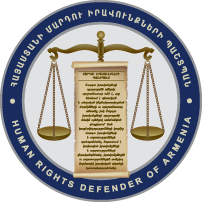The Constitutional Court recognized unconstitutional the legal regulations stating the automatic (by default) deprivation of the contact with outside world of detainees and convicted persons transferred to the disciplinary cell, based on the application submitted by the Human Rights Defender. The Court stated June 5, 2019 as a deadline for the National Assembly and the Government, giving a possibility to correspond the challanged provisions to the requirements of the decision, otherwise they will be declared repealed.
According to the Court decision, the challanged regulations contradict the articles of the Constitutions guaranteeing the tights on private and family life inviolability, freedom of communications, as well as the principle of proportionality.
Within the application submitted to the Constitutional Court the Human Rights Defender challanged the provisions of the RA Law on Treatment of Arrestees and Detainees, RA Penitentiary Code, as well as the Government Decision on Internal Rules of Places for Keeping Detainees and Correctional Institution. By those regulations it was envisaged that in case of applying the “transferring to the disciplinary cell” as the disciplinary sanction against detainee or convicted person, despite any circumstance he/she is automatically (by default) deprived of the contact with outside world, based on the imperative ban. It was stated in the application of the Human Rights Defender, that under such regulations, it turns out that this type of sanction has the nature of inflicting additional deprivations, which has no connection with its aim and reasons. The disciplinary sanction itself applies by the decision of the head of penitentiary institution, but the issue of depriving communication is not justified. Under this circumstances the individual approach is not ensured and the behavioral risk of person deprived of liberty is not assessed.
The Constitutional Court reaffirmed the Defender’s position, that the additional restrictions against the persons transferred to the disciplinary cell should have direct link with conducted violation. The restriction of basic rights and freedoms must be necessary in order to achieve the legitimate aim.
The Court affirmed the Defender’s conclusion, that the isolation of person may cause a mental depression, and providing literature other that the religion ones can have a positive impact on person.
The Constitutional Court used as a ground of its decision also the CoE, EU and UN international standards, practices and the experience of other states on ensuring the right on contact with outside world of detained and convicted persons, presented by the Human Rights Defender.



